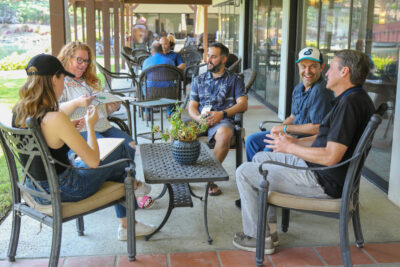
5 Tips for Leading Church Meetings that Matter
Meetings are invaluable for churches who want to run efficiently with as little miscommunication as possible. Here are 5 tips for running great meetings.
I’ve heard meetings described as necessary evils, but are they? Meetings are invaluable for churches who want to run efficiently with as little miscommunication as possible. Most of the people who would say that meetings are a terrible waste of time have probably not been in an organization that runs staff gatherings well.
It’s true, meetings can be an inefficient waste of time, but they don’t have to be. Here are 5 tips to running effective church meetings:
1. Don’t meet if you don’t have to
There is absolutely nothing worse than sitting through a meeting that could have been an email or a simple Slack message. Most of the negativity your people feel toward meetings is because of the time that they’ve spent sitting in meetings that didn’t need to happen.
If you’re wondering if this should be a meeting or not, ask yourself if the topic needs outside input in order to move forward. If it does, will it require real-time discussion, or can you get by with an email?
2. The church meeting organizer needs to be prepared
Create a culture that says, “If you called the meeting, you’re the most prepared person in the room.”
This means:
- Preparing and distributing and agenda ahead of time
- Knowing exactly what you need from the meeting in order for it to be successful
- Understanding what some of the questions or objections will be, and having responses prepared
- Knowing exactly who needs to be there—and who doesn’t
3. The attendees need to be prepared
Sure, the organizer needs to be the most prepared, but that doesn’t mean that the attendees should show up in the dark. Hopefully the organizer is preparing an agenda ahead of time and getting it in the hands of everyone who will attend.
Attendees should read the agenda and attachments, and come with notes related to their involvement or expertise. This is also a good time for potential attendees to sanity check whether they even need to be there. If they don’t, they should politely respond with a question about their involvement.
4. Respect everyone’s time
The previous three tips have flowed from this principle, but there are many more little things you can do to show regard for the time of everyone present.
Stick to meeting times: Plan for meetings to be as short as possible, and don’t let them run over the time allotment you’ve set for them. If a meeting is scheduled to start at 1:00 p.m. and end in a half hour, it should start and end on time.
Go ahead and get to work: A lot of organizers think they can get better results if they ease into the meeting with some small talk. This just eats up valuable time. Go ahead and get to it.
Don’t make everyone introduce themselves: Sometimes you have to run a meeting where everyone doesn’t know each other. Please . . . please . . . PLEASE . . . don’t make everyone go around the room and introduce themselves. No one is going to remember all the information, and the introverts in the room will wish they were anywhere else.
Curtail the rambling: Nothing says, “I’m not entirely prepared” like pointless rambling. Starting with a general idea and thinking that you can wing it from there typically leads to unfocused and unclear dialogue. Brevity isn’t just the soul of wit; it’s a sign of competency.
A good meeting leader will also keep discussions on track. Sometimes rambling occurs because some people are processing ideas out loud, and sometimes it’s because attention seekers love to hijack meetings with endless filibusters. It’s OK to say, “Hey, I don’t want to run long here, so can you summarize your point in two sentences?”
Draw out input from reserved people: Not everyone is comfortable speaking up in a meeting, but that doesn’t mean that they don’t have valuable things to share. Leadership is about learning how to draw out opinions from quiet people—and knowing whom to approach later for input.
If you notice that there are people who regularly avoid interjecting, catch them after a meeting and ask say, “Hey, I notice you don’t speak up a lot in the meetings, but I really care about your input. Would it be OK if I ask for it during meetings, or can I occasionally meet afterwards so I can hear your thoughts?”
5. Have a post-meeting action plan
One of the difficult things about meetings is that they often exist in vacuum. It’s like you step into them to talk about important ideas and principles, but once everyone leaves, the discussion stays in the room.
Meetings that matter should be action-oriented. You don’t need to dish out next steps during the meeting, but the people in the meeting need to know that they can expect some follow-up that includes next steps.
Here’s how to make sure that occurs:
- Have someone taking notes: This person should be very detail oriented. You want the best notes possible from the meeting. Make sure you ask the person to take notes before the meeting.
- Go over the notes: Spend some time looking at the notes and re-examining the meeting. Ask yourself:
- What were the best parts of the meeting?
- What are the logical next steps?
- Who should be responsible for the completion of every action item?
- What did I learn in this meeting that can help improve the flow of the next meeting?
- Create a post-meeting email: Remind everyone what was covered, what the next steps are, and who is responsible for what.
How you do it makes all the difference
We’ve all sat through bad meetings, but that doesn’t mean that it’s the meetings that are bad. Sometimes it’s about discovering better ways to do these important things. Harnessing the power of meetings can really help your church team grow together.





